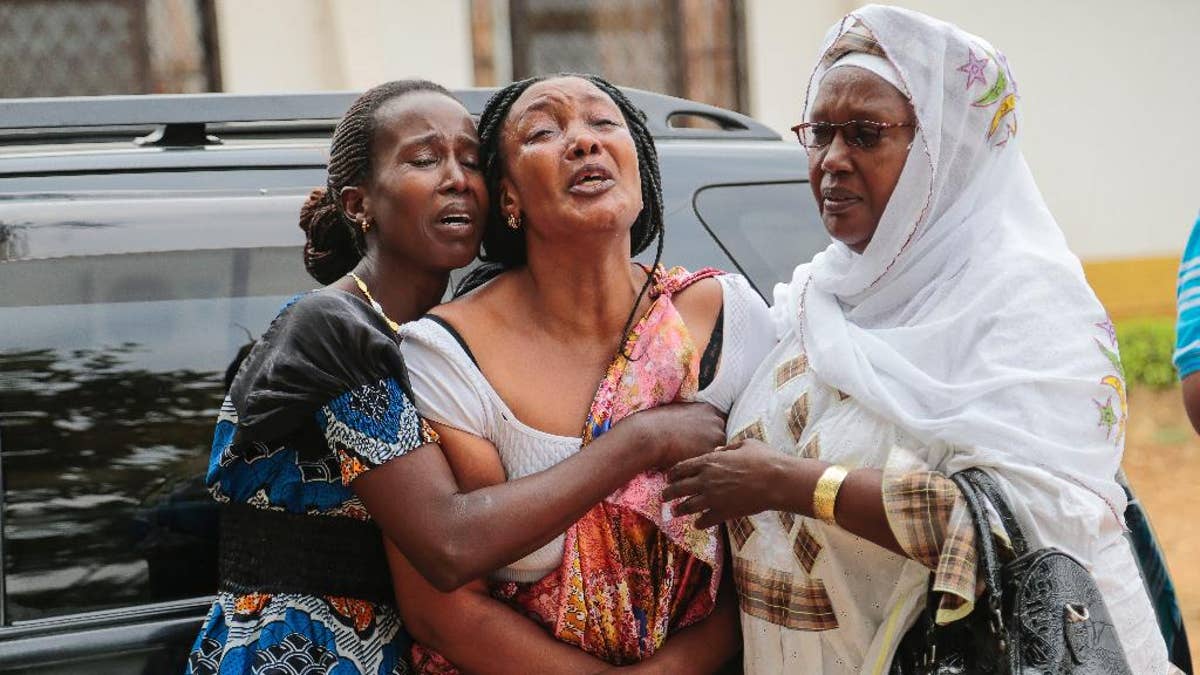
FILE--In this file photo dated Friday, July 3, 2015, relatives and friends grieve during the funeral of Patrick Ndikumana, in Bujumbura, Burundi. Dead bodies keep turning up, dumped at roadsides and in water streams where they are discovered by people who don’t recognize the victims. More than two months after President Pierre Nkurunziza was controversially re-elected, many parts of Burundi still echo with gunfire, grenade explosions and assassination attempts on prominent figures.(AP Photo/Bertheir Mugiraneza-File) (The Associated Press)
BUJUMBURA, Burundi – Bodies keep turning up in Burundi, dumped at roadsides and in streams. Mass arrests are being carried out.
The killings and arrests have triggered fear and uncertainty across this central African country that was already shaken from protests and a coup attempt earlier this year.
It appears no one is safe from a growing state of anarchy.
Ordinary life in many parts of Burundi is now punctuated by gunfire, grenade explosions and assassination attempts on prominent figures opposed to or allied with President Pierre Nkurunziza, who recently sought — and ultimately won — a controversial third term in office.
Amid reports that a rebel group is being formed, the government has been searching volatile neighborhoods of the capital, Bujumbura, with the attempt to take weapons out of civilian hands fueling the fear many here already have of security forces.
Valentin Vyabagabo, a resident of the Kinyankonge neighborhood in the north of Bujumbura, said he saw bodies floating on the Nyabagere River through September. One of the victims was later identified as a bus driver in the Bujumbura neighborhood of Musaga, an opposition stronghold where, at the height of street protests earlier this year against the president, residents erected barricades of burning tires and pelted the police with stones.
"We think these people were killed elsewhere and then the killers brought the bodies here," Vyabagabo said.
A rebel movement is apparently being formed against Nkurunziza by military officers loyal to the generals who led a failed coup in May. The deputy commander of an elite infantry unit, Maj. Emmanuel Ndayikeza, failed to show up at work on Monday, sparking speculation he had gone over. Then on Tuesday, Lt. Col. Edouard Nshimirimana was reported missing with more than 100 Motorola radios and three computers.
Military spokesman Col. Gaspard Baratuza said the officers will only be considered deserters if they don't returned to work after eight days, but their absence is fueling talk of a divided military.
"There is definitely an anti-Nkurunziza armed group that has been formed already," said Carina Terstakian, who researches Burundi for Human Rights Watch.
"Those people have been hanging out in Rwanda for several months now," she said. "We believe it is happening."
Rwanda's justice minister, Johnston Busingye, said he was aware of the allegations but gave no comment.
The U.N.'s top human rights official said Monday there has been an alarming upsurge in arrests, detentions and killings in Burundi since the beginning of September, with bodies found almost daily on some Bujumbura streets.
In many cases, the victims appear to have been killed by a bullet fired at close range, United Nations High Commissioner for Human Rights Zeid Ra'ad Al Hussein said, citing reports that suggest many of the victims were arrested beforehand by the police or the National Intelligence Agency.
"We have seen an intensification of search operations allegedly aimed at seizing illegal weapons, in specific neighborhoods of Bujumbura and in other parts of the country," he said in a statement.
Although the current violence is political, Burundi has a history of deadly conflicts in which the country's Hutu and Tutsi ethnic groups targeted each other. Nkurunziza took power in 2005 near the end of a civil war in which an estimated 300,000 people were killed between 1993 and 2006.
There are reports that a rebel group is being formed in villages nestled in green rolling hills and inside the dense Nyungwe forest on the Rwandan border, where, according to a military announcement in July, troops killed 31 suspected rebels and captured 170 others in a gunfight.
There have been several attacks on military outposts. In addition, the army chief, Maj. Gen. Prime Niyongabo, survived a drive-by shooting on Sept. 11, and Lt. Gen. Adolphe Nshimirimana, a former intelligence boss, was killed in a rocket attack on his vehicle in August.
In an apparent bid to prevent young people from being recruited by rebels, the government has been carrying out mass arrests, including in the rural provinces of Ruyigi and Gitega. Hundreds are believed to have been detained.
Detainees are often transferred to facilities far from their homes, apparently to guard against possible jailbreaks, said lawyer Onesime Kabayabaya, who represents some of the detainees.
In a televised speech late Wednesday, Nkurunziza urged civilians to turn in any weapons in their possession, and promised to free children over who were arrested during the anti-government protests.
The United Nations High Commissioner for Human Rights said his office has registered 134 killings, 90 cases of torture and hundreds of cases of arbitrary arrest and detention in Burundi since April, including 704 arrests in September.
The violence has affected many ordinary citizens. Roadside strolls are risky. Some businesses are no longer viable.
Rachid Mukiza, who operates a tricycle that is a popular form of transport in Bujumbura, complained bitterly that he now struggles to look after his family because there are fewer clients these days. A 7 p.m. curfew imposed on public transporters in Bujumbura has reduced his workday, cutting his earnings by half.
"Because of this situation I even do not have money to buy the school materials for my children," he said. "If the situation endures, we will all become thieves and I think this will not please the government."
___
Muhumuza reported from Kampala, Uganda.
